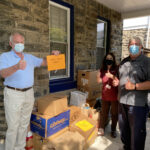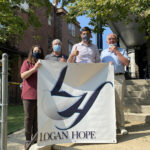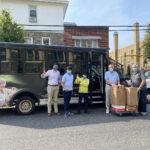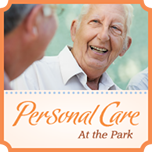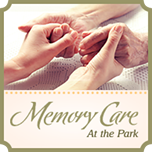At Gloria Dei Communities, September is our favorite time of year! As the seasons transition, the excitement of new opportunities fills the crisp air. And with the arrival of fall, the beginning of a new school year is just right around the corner. It’s time for Tools for Schools!
Senior residents and staff of Gloria Dei’s CARES Committee organize Tools for Schools annually. Every year, those involved in this outreach program choose two schools to give back to. This year, our residents donated items to provide much-needed support. Our residents find great joy and satisfaction in knowing they are genuinely making a positive impact on children and their education.
On September 13, we had a meaningful visit to William McKinley Elementary School in Philadelphia and Benjamin Rush Elementary School in Bensalem. Gloria Dei Communities gathered school supplies, sports equipment, jump ropes, and chalk for the children to enjoy during recess. The schools and their students were beyond appreciative to have the opportunity to have fun, explore creativity, and better their education. See the images below to relive the wonderful day.
Find support and compassion in an isolating time.
Caregiving is a stressful and often thankless task. Providing quality care for someone in need demands patience, compassion and strength. It is not an easy 9-to-5 job and it can take a toll on you in ways that may not be obvious. One of the most important things to remember when providing care for a loved one is that you are not alone. Though it may seem lonely at times, others have experienced the same challenges. There are resources available that can help you manage your role of caregiver. If you are caring for a loved one, and find yourself struggling, the first step is to identify these challenges and stressors. Then seek out a workable solution to help create a healthy day-to-day environment.
Time management
Though caregiving can often have downtime, it is always a 24/7 responsibility. You are “on call” no matter the time of day. This makes it difficult, if not impossible, to schedule work, social events, family time and other activities. You don’t have time for yourself. To help manage your time, you may need outside help to relieve you of some responsibility. From hourly care to all-day care, there are resources available to give you back the time needed to care for yourself.
Financial strain
If you find yourself struggling to make ends meet while providing care, you are not alone. According to a Harvard study, 32% of workers who provide informal home care quit their job to keep up with their caregiving responsibilities. When you offer care, you are often sacrificing your financial future. This should be greatly considered when looking for outside help. How much money are you losing by doing the work yourself compared to how much outside care would cost? Professional caregiver services may be the most cost-effective solution.
Feeling of isolation
There is no denying that caregiving is lonely work. You spend much of the day without social interactions or real conversations. You may feel invisible to the rest of the world. You may feel that no one understands what you’re going through on a daily basis. When you find yourself feeling isolated, reach out to friends and family. They may not make the first move to check in on you, so it’s important to keep the line of communication wide open. Simply calling a friend and talking for five minutes can boost your spirit. And chatting online in a video call with friends and family has never been easier. Set up regular check-ins and times to talk.
Being overwhelmed
Many informal caregivers feel the need to do everything themselves. They think: This is my role. This is my sole responsibility. And it’s up to me alone to maintain a level of high-quality care. You do not need to do it all yourself. You are not alone. No one expects you to do everything. And trying to put on a brave face and take on all duties will only end in greater stress. Ask for help. Seek out caregiving resources. Understand that trying to do it all is harmful to your emotional and physical health. When you are overwhelmed with responsibilities, look for friends and family as well as professional help. The best, most effective caregiving is a team effort.
Decreased physical health
Some common physical issues caregivers encounter are sleep deprivation, poor eating habits and neglecting their own health. These quickly snowball into dangerous challenges. Acknowledge that caregiving is strenuous work and give yourself the time needed to take care of yourself. Maintain regular doctors appointments. Take all prescribed medications. Monitor your blood pressure, heart rate and weight. Talk with your healthcare provider about any concerns. And above all else, give yourself permission to live a healthy life.
Finding the right help
Caregiving is about much more than driving a family member to a doctor’s appointment. You often give up your time, your money and your own health to support a loved one. But there are helpful caregiving solutions to eliminate the stress. Talk with a friendly Gloria Dei caregiving expert to learn how to ease the challenges you face and ensure a happier and healthier quality of life for you and your loved one.
Feeling overwhelmed? Find a healthy caregiving solution with Gloria Dei
Predicting Dementia: A Blood-Brain Barrier Test Examined
Predicting dementia is a quickly moving science. Advances in the past decade have led researchers to new methods of predicting, diagnosing and treating cognitive impairments. But there is still a great deal of work to be done in the field. Recent studies have found a potential new way to help predict cognitive impairments such as dementia and Alzheimers: A blood-brain barrier test. Is this an accurate dementia test?
What is the Blood-Brain Barrier?
Your brain needs a safe and consistent supply of nutrients to function properly. But, it also needs protection from harmful bacteria and toxins. The blood-brain barrier works as this shield, filtering out the toxic chemicals, viruses and parasites while ushering in the helpful cells. The blood brain barrier is part of the central nervous system. And scientists are now looking at biomarkers that indicate a connection between a breakdown in the blood-brain barrier and cognitive impairments like dementia.
How is the Blood-Brain Barrier tested?
Predicting dementia with a blood-brain barrier test will begin with blood tests and an MRI of the brain. Doctors will look for specific proteins and abnormalities that indicate if the blood-brain barrier isn’t working properly. Early studies have shown that individuals with cognitive impairments such as Alzheimer’s disease and dementia have measurable breakdowns of the blood-brain barrier in certain regions of the brain. Using that data, it may be possible to predict dementia and Alzheimer’s by taking an active look at the blood-brain barrier.
Is the Blood-Brain Barrier a Dementia Test?
The early results of the blood-brain barrier test are promising, but it’s still too early to determine if this is an effective method of predicting dementia. Scientists continue to discover new connections between dementia and human biology. Many are hopeful that we will soon have accurate ways to predict dementia and test for cognitive impairments early enough that treatment options can be used to delay debilitating symptoms of dementia and Alzheimer’s disease.
Is the Blood-Brain Barrier Harmed During a Covid-19 Test?
No. This rumor began circulating in the summer of 2020, but as USA Today noted, it’s nearly anatomically impossible for the Covid-19 nasal swab to reach the blood-brain barrier. Your nasal cavity has several layers of protection before anything can penetrate up the noise and impact the blood-brain barrier. The nasal swab test for Covid-19 is safe and has no connection to cognitive impairment.
On September 15th, 2021, Gloria Dei once again delivered school supplies for our annual Tools for Schools program. It’s one of our favorite times of the year! It is a collaboration from all of our senior residents from all of our communities. Our residents find this donation drive to be deeply satisfying and love to give the much needed supplies to the children. However, this year was a little different. Our visits needed to be abbreviated due to COVID19, fewer staff were able to come and our residents had to skip visiting this year. That being said, we’re very thankful for ANY opportunity to participate this year, since we were unable to do so last year.
In case you forgot what this program is all about, Tools for Schools is a community outreach program through Gloria Dei CARES Committee that includes representatives and employees from each Community. Every year two schools are chosen to donate school supplies based on the needs of the school. This year, the two schools chosen were Cayuga Elementary School, a Philadelphia Public School that’s K-5 with about 450 students. And Logan Hope, a K-8 school that provides rigorous and holistic education for students in the Logan Neighborhood of Philadelphia. They’re committed to helping their students for academic success through character and leadership development. We could not have selected more deserving schools than Cayuga Elementary and Logan Hope. If you’d like to check out some of the photos from Wednesday, September 15th, click the images below.
Gloria Dei Communities outreach programs embody the idea that it’s better to give than to receive. And you can see that on the smiles of everybody involved as they delivered the supplies to each school. Of course, how could you not smile when you have the opportunity to meet with such wonderful administrators, teachers, and students! Thanks again to Cayuga Elementary and Logan Hope for such a wonderful day.
How to help a loved one take the next, positive step in their life when transitioning to an active living community.
No matter what age or living situation, moving is a major part of life. And when a loved one is ready to move into an active living community, it can be just as stressful and disorienting as a student heading off to college or a couple buying their first home. But when a family member or friend is ready to transition from their current home to a new, more accommodating facility, it’s important to support them on the journey. If you’re helping a loved one relocate to a 55+ active living community, understand the significance of the move, and offer the care and compassion they need to ensure a safe, positive change in their life.
Focus on the Positive
Transitioning to an active living community should be a fun and exciting experience. By making the move, a loved one will eliminate the stress and frustration of living alone. From having access to helpful staff and resources, to growing a new, robust social life, the new community provides a safe and friendly place for active seniors to enjoy life.
There will be no more lawns to mow in the summer or driveways to shovel in the winter. Your loved one will no longer worry about home maintenance and property upkeep. All the headaches and concerns of homeownership vanish in a quality senior community.
Look for the amenities the new community offers. Today’s active 55+ facilities have much more to offer than just a craft room and a TV lounge. Beautiful walking paths, coffee shops, beauty salons, game rooms, computer rooms and more transform a senior residence into a friendly and fun community. And with a rich activity calendar, your loved one will have the opportunity to try new things and rediscover old hobbies.
Be supportive of this transition by recognizing all the great new opportunities your loved will experience. And take comfort in knowing all the hassles of their old living situation can be left behind.
Transitioning is a Process. Don’t Go Too Fast.
You and your loved one may worry that moving to an active living community means they will be simply dropped off at the front door and forgotten. It’s important for everyone involved to make the move at the right pace. Introducing a senior to a new place may take time. Ensure the new resident that this is not a rushed experience, and they are in control.
And stay connected. Reassure your loved one that you will call and visit often. Remind them that while this is a new home, it won’t change your relationship. Holidays and special events will still be celebrated. Relatives and friends will still stay in touch. The lines of communication will always remain open. And let them know everyone is supportive of the new change — they’re not leaving anyone behind.
Enjoy the Space
Let your loved one show you around — let them guide you on a tour of their new home. They take pride in the beautiful new community and will want to show it off. And a great way to support your loved one is by helping them decorate the space with familiar photos and memories. Help make their new environment inviting and loving. The transition is less abrupt and more friendly when you show them you care.
Talk with your loved one about meeting new people and look for new activities offered by the active living community. And take an active interest in their new social life by asking them questions and meeting their new friends.
Allow Them to Maintain Independence
The key to a successful transition is staying as independent as possible. This will not only help your loved one adjust to new surroundings, it will give them confidence when interacting with new people and accomplishing tasks. Keep your loved one motivated and encourage their independence in the safe environment of the active living community. Don’t be afraid. Don’t worry that they will be left helpless in a strange place. Your loved one is ready to make the move to an active 55+ community, a community dedicated to safe and friendly living. Let them enjoy their new home.
Support Your Loved One In Your Own unique Way
No one knows your loved one better than you. Talk with them. Ask them questions. Listen to their answers. And always reassure them that transitioning to an active living community is a fantastic part of their golden years. Take your time and understand every part of the process. And if you have any questions or concerns, you can always reach our helpful staff.
Give your loved one an amazing new place to grow, learn and enjoy their life.
Understanding the potential link between poor oral hygiene and increased risk of Alzheimer’s disease.
As Alzheimer’s disease cases increase in America, many scientists and experts are looking to find the cause of this debilitating disease. In 2020, 5.8 million Americans were living with the disease. And by 2060, the CDC predicts 14 million Americans will suffer from Alzheimer’s disease. A recent study may shine a light on some of the causes of Alzheimer’s disease, and it starts in an unlikely place: The gums.
Can Gingivitis Lead to Alzheimer’s Disease?
A 2019 study published in Science Advances shows a link between gum disease and Alzheimer’s disease. A bacteria called Porphyromonas gingivalis is often the cause of gingivitis and gum disease. This bacteria does not need oxygen to survive and can often be found hiding under the gum line and between layers of plaque. It can cause your gums to swell and bleed.
While gingivitis and gum diseases are common and can be prevented with proper brushing and flossing, it was not until recently that the bacteria has been shown as a possible cause of Alzheimer’s disease.
The gum disease bacteria can move from the mouth to the brain. Once in the brain, the bacteria releases an enzyme called gingipains. A study of deceased Alzheimer’s patients found that nearly all of them had increased levels of gingipain. And a study published by JAMDA found that people who have lost teeth are more likely to experience cognitive decline
How to Prevent Gum Disease and Reduce the Risk of Alzheimer’s Disease
The first step to preventing gum disease is with proper oral hygiene and regular dentist visits. Brush your teeth twice a day, for two to three minutes. Floss daily to remove plaque from hard to reach areas. And if you smoke, stop.
Signs that you may have gum disease include bad breath, loose teeth, inflamed gums, bleeding gums and gums that are receding from the teeth. Talk with your dentist about gum health and gingivitis. They may recommend a therapeutic mouthwash.
The link between gum disease and Alzheimer’s is still being carefully studied, but taking better care of your teeth and gums is one simple way to lessen the risk of mental decline. Any method that may prevent Alzheimer’s disease is one worth exploring.
If you have questions about Alzheimer’s patient care, contact us.
Guilt is one emotion that every family caretaker may experience at some point during their journey. When you take on responsibility for another person, there is an enormous amount of pressure to make this individual comfortable and happy, while also trying to balance your comfortability and happiness as well. Of course, care decisions are rarely black and white. No one always makes the right call in every circumstance. Mistakes are part of human nature, but we do our best with the information and resources we have at the time.
One of the most guilt-inducing decisions that many family caretakers face is whether care community placement is in a loved one’s best interest. Even if a parent requires an intensive level of care and around-the-clock supervision, something that a caregiver is unable to provide single handedly, this matter is commonly accompanied by a sense of defeat.
Reasons We Feel Guilty
Even when you know relocating your parents to a senior living community is the right thing to do for their safety and health, guilty feelings may arise. Here are a few.
We feel our caregiving efforts have failed
We assume the act of moving loved ones into a community declares loudly and clearly that we can’t handle taking care of them. The paradox, of course, is that we want nothing more than to ease our parents’ burden of everyday living, even to sacrifice our comfort temporarily to improve their overall lives. This is still being accomplished, if you move them to a Personal Care or Memory Care community. There’s no reason to feel like you’ve failed at all.
We promised we’d let our loved one age at home.
While in the past you may have your parents’ promises, decisions must be made based on what’s best for the parent at the given time. Often, putting a parent in senior living is the most loving act that a child can do because it improves the quality of the parent’s life from medical and social perspectives. Parents often thrive, to their great surprise.
We know we’re asking a lot from our parents
Change is hard for everyone, and a move to a care community is a big change. Suddenly, you’re asking your parents to form acquaintances, trust professional caregivers, navigate unfamiliar schedules, and acclimate to new environments. But as we mentioned in the previous bullet point, parents often thrive in these new environments!
How to Deal With Guilt
1. Realize that you didn’t cause your loved one’s illnesses or age-related decline.
Whether facing age related issues or a progressive illness like Alzheimer’s or Parkinson’s, your loved one would still have to deal with their declining health whether you continued functioning as their sole caregiver or chose to bring in outside help.
2. Understand that professional care is often a necessary next step.
A higher level of care provides both increased safety and comfort for an aging loved one. Care communities conduct thorough needs assessments of potential residents prior to move-in. If your parent or parents are admitted because they require skilled nursing care and consistent supervision, then Personal Care or Memory Care is the appropriate setting for them.
3. Take time to acknowledge and appreciate that you are doing the best you can.
Being the primary caregiver for a parent is a huge responsibility. We must make decisions about situations that we’ve never encountered before and handle matters that often seem to have no right or wrong answers. Once we’ve made a care decision, we must endure the consequences. This may mean lots of fast-paced changes or it might mean maintaining the status quo for the time being. You’ve taken on a difficult role and you’re doing your best to make decisions based on the information and resources you currently have.
4. Learn to understand that you can’t live life for other human beings.
You can only help so much. Total control of events isn’t in your hands. There might not be a solution that makes everyone happy or solves every problem. Do your best to handle what is within your abilities, and then let the rest go.
5. If your parent is being well cared for, then let the facility do its job.
The bulk of your loved one’s care is the community’s responsibility now. Visit often, advocate for them, and do small things to brighten their day and make their life easier, but then move forward with your own life. You’ll have more energy and quality time to devote to all your relationships, and that benefits everyone!
My Father, Khody, lived at Gloria Dei Personal Care and Memory Care at the Park in Hatboro, PA for the past seven years.
We would take dad for short overnight visits on holidays or to Avalon, NJ with family. He enjoyed the change of scenery, as well as returning “Home” to Gloria Dei. He liked to call the “front desk” to inform them he was returning. Upon his return, he loved to review all the things that were “included” at Gloria Dei.
Dad was just pleased to return to his friends and the predictability of his environment. He enjoyed the food and the activities, as well as never feeling lonely without mom.
Upon transfer to Memory Care about two years ago, the transition was seamless. I truly believe his health and life were enriched by the care and socialization he experienced during his residence.
I am a registered nurse and I was extremely pleased every step of the way with communication to nursing staff, as well as physicians. All staff are caring and top notch. My brother was also happy with dad’s care and came regularly for lunch.
– Victoria S. R.N.







